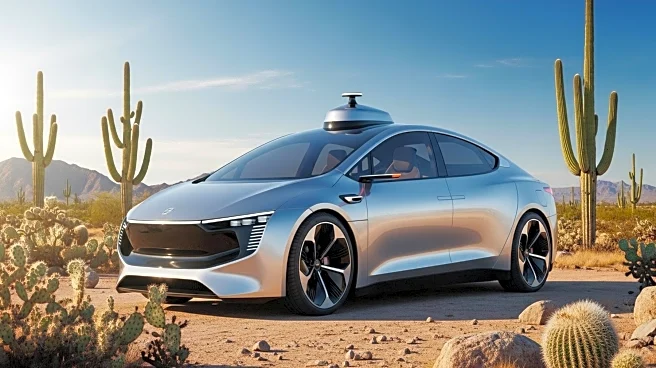What is the story about?
What's Happening?
Tesla Inc. has received approval from the Arizona Department of Transportation to test self-driving robotaxis in the Phoenix Metro area. This marks a significant expansion of Tesla's autonomous ride-hailing services, following initial trials in Austin, Texas. The approval allows Tesla to conduct tests with safety drivers on board, as part of its efforts to roll out autonomous services across the U.S. The move comes amid regulatory changes under the Trump administration, with the National Highway Traffic Safety Administration easing autonomous driving regulations.
Why It's Important?
Tesla's expansion into Arizona represents a major step in the company's ambitions to lead the autonomous vehicle market. The approval to test robotaxis in a new region highlights the growing acceptance and integration of self-driving technology in public transportation. As Tesla aims to reach half of the U.S. population with its ride-hailing services by the end of 2025, the development could significantly impact the transportation industry, offering new mobility solutions and potentially reducing traffic congestion. However, the expansion also raises questions about safety, regulatory oversight, and the impact on traditional transportation jobs.
What's Next?
With the approval to test robotaxis in Arizona, Tesla is likely to continue expanding its autonomous services to other regions, seeking further regulatory approvals. The company may face increased competition from other players in the autonomous vehicle market, such as Waymo and Zoox. As the technology advances, policymakers and industry stakeholders will need to address safety concerns and establish clear regulations to ensure the responsible deployment of self-driving vehicles. The success of Tesla's trials could pave the way for broader adoption of autonomous transportation solutions.
Beyond the Headlines
The expansion of Tesla's autonomous services highlights the transformative potential of self-driving technology in reshaping urban mobility. The development raises ethical and legal considerations, such as the implications for privacy, data security, and liability in the event of accidents. As autonomous vehicles become more prevalent, society will need to navigate the cultural shifts associated with changing transportation norms and the impact on employment in traditional driving roles. The integration of self-driving technology also presents opportunities for innovation in urban planning and the design of future cities.
















